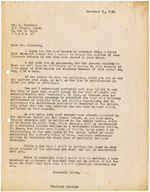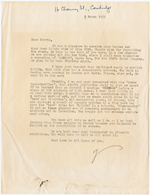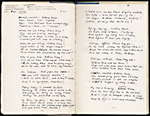Building Cornell University Library’s Collections
Vladimir Nabokov at Cornell
Vladimir Nabokov, his wife Véra and son Dmitri arrived in Ithaca on July 1, 1948. He began his duties as Professor of Russian Literature in the fall, teaching three courses on the subject, one in translation and two in Russian. By the end of his more than ten years at Cornell, he had become famous as the author of Lolita and Pnin and known on campus as a lecturer not to be missed.
While at Cornell, Nabokov wrote some of the richest and most enduring works of his career. In 1953 alone, he had five writing projects in process. He was well into a translation of The Song of Igor’s Campaign, a monumental translation of Eugene Onegin, and a translation of his Conclusive Evidence into Russian. At the same time, the outline for Pnin was taking shape, and Lolita was an all but completed typescript.
Cornell’s Nabokov collection is supported by funds from the Class of 1956 Rare Book Endowment and by generous gifts from alumni and friends.
 |
Vladimir Nabokov. Typed letter to Maurice Girodias, December 14, 1956.
Cornell’s Division of Rare and Manuscript Collections contains a rich trove of materials documenting Nabokov’s life and work, particularly the work he published during the years he spent at Cornell. Cornell’s Nabokov collection includes annotated and inscribed first editions of his books, and more than 2,000 documents and letters about the history of the publication of Lolita and other works. Nabokov endured a rocky relationship with the first publisher of Lolita, Maurice Girodias of the Olympia Press in Paris. In this letter Nabokov outlines his plans for preparing an American edition of the controversial novel. Purchased with funds from the Class of 1956 Rare Book Endowment |
 |
Vladimir Nabokov. Typed letter to Morris Bishop, March 6, 1956.
The Cornell University archives contain letters between Vladimir and Véra Nabokov and Morris and Alison Bishop. Morris Bishop was Chairman of Cornell’s Department of Romance Languages and instrumental in hiring Nabokov at Cornell in 1948. The couples maintained an enduring friendship, even after the Nabokovs departed for Europe in 1959. Nabokov writes to Morris Bishop, urging him to give Lolita a try. He is emphatic about the merits of the novel: “I know that Lolita is my best book so far. I calmly lean on my conviction that it is a serious work of art, and that no court could prove it to be ‘lewd and libertine’.” Gift of Jon ’56 and Virginia ’56 Lindseth |
 |
Vladimir Nabokov. “Wanted, Wanted.” Autograph manuscript in Poems. London: Weidenfeld and Nicolson, (1961).
The poem Nabokov inserts in Lolita to express Humbert Humbert’s grief over Lolita’s departure remained one of the author’s personal favorites. In this copy of Poems, annotated for public performance, Nabokov has written out the poem on the rear endpapers. The book is further annotated throughout in Nabokov’s hand with performance notes on vocal stresses, estimated reading times, and reminders to “pause” after reading each poem. Gift of Jon Lindseth ’56 and Virginia Lindseth ’56 |
 |
Vladimir Nabokov. Look at the Harlequins! New York: McGraw-Hill [1974]. [zoom] Nabokov inscribed this copy of his last novel to his wife, Véra, including a fanciful drawing of a butterfly that makes a playful connection to the title of the book. Gift of Gail ’56 and Stephen Rudin |
 |
Vladimir Nabokov. Pnin. New York: Avon, ca. 1957. [zoom] Cornell’s rare book collections feature a comprehensive gathering of Vladimir Nabokov’s first and later editions. The publishers of this paperback version of Nabokov’s novel, Pnin, attempt to capitalize on the fame of Lolita with cover art designed to draw readers’ attention to that notorious work. |
| View a photo of this exhibition case | |